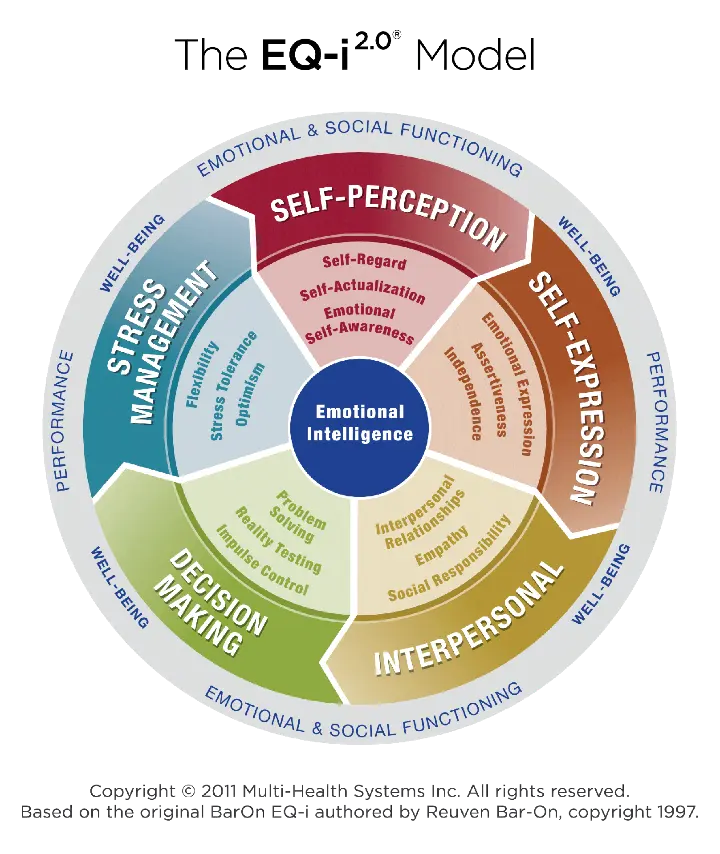Learn to lead with confidence
Calling all:
- Managers who feel stuck with their team’s progress.
- Executives who want to inspire their people but don’t know what to do differently.
- Leaders who are getting burnt out because they’re not where they thought they’d be.
Do I have your attention?
Awesome. Because I’m about to talk about one of the most important parts of my coaching practice.
And that’s emotional intelligence (EQ) in leadership.
If you’re thinking – “This seems too abstract,” “I don’t have the time,” or even “I’m emotionally intelligent enough, I can’t possibly learn anything new.” Then this is definitely the post for you.
Because I get that this is a big topic to break down. I know how busy you are (I’m right there with you). And I believe that you already have a great amount of emotional intelligence.
But I also know how critical emotional intelligence is to leadership. I’ve seen my clients gain way more confidence in their leadership after working with me to take a closer look at their emotional intelligence skills. And the need for emotional intelligence in the workplace isn’t going anywhere – more on that later, though.
My plan is to make this topic as easy to grasp as possible for y’all. In this post, we’ll cover the basics – what emotional intelligence is, why it’s important, and how I help queer leaders like you gain confidence in their EQ skills.
Then in future posts, we’ll break this topic down even further– because there’s that much to talk about.
For now, let’s lay the foundation of what emotional intelligence is all about. And as a way to further support you in this area, I’ve got a guide that I’ll share with you at the end.
Let’s do this!
What is emotional intelligence?
Have you ever been in a meeting and felt like no one was on the same page? Like people were talking but no one was actually listening? Or that your colleagues couldn’t care less about actually solving anything because they were only focused on their point of view?
What did you do? Did you try to empathize with your colleagues? Did you try to consider everyone’s unique perspective? Did you try to stay optimistic?
If you did any or all of those things – congratulations! That means you were using emotional intelligence skills. And emotional intelligence is a skill set that’s natural for queer leaders. So, you’re already on the right track. But there’s also a lot more to it– I’ll show you that next.

Holding a meeting where you and your team can communicate effectively and empathize with each other is a significant marker of an emotionally intelligent environment.
Photo by fauxels from Pexels
Emotional intelligence is a set of emotional and social skills that we all use to make sense of the emotional information we need to engage in the world around us.
Emotional intelligence:
- Impacts how we perceive ourselves and others.
- Affects how we get our ideas and thoughts across to others we work with.
- Plays a role in how we grow relationships.
- Guides our coping mechanisms for dealing with challenges.
- Allows us to process emotional information in a purposeful way.
We all have emotional intelligence. And the great thing about EQ is that it tends to improve over the course of a lifetime. This study by Chen et al shows that EQ “develops with age and experience,” unlike IQ (cognitive intelligence) and personality traits, which tend to be more fixed. [1]
You might feel stronger in some EQ areas and have room for growth in others. We all have room for improvement, so let’s check out why you’ll want to spend some time focusing on this area of your leadership.
Why is emotional intelligence important for leaders?
Did y’all know that emotional intelligence impacts how effective a leader can be? These are pretty essential workplace skills. And EQ will only continue to become more important as Gen Z gets more involved in the workforce. This Forbes article by Mark C. Perna shows that Gen Z employees consider real connection a “non-negotiable” from their leadership. [2]
Wondering why? You might already know– but I’ll tell you that next.
As a queer leader, emotional intelligence skills are the way for you to embody a more humanized way of leadership and working.
Because here’s the thing— normative leadership narratives come from capitalism. It’s a system that relies on dehumanizing people in the workforce. So, when we work on these skills, it allows us to repair some of that. It allows us to work in connection with our own and others’ humanity.
Let’s take it one step further. Queer folks (and many other marginalized/minoritized folks) are adept at using emotional information to survive. We need this skill to take care of ourselves and cope. So not only are EQ skills essential to leaders, but they’re also a big part of how we keep ourselves safe in the world.
Since you already have so many inherent EQ skills, you’re already on the right track to improving them. Wanna see how? Keep reading— next, I’ll show you how I work with other queer leaders to increase their EQ, and how you can get started, too.
How can my coaching help you improve your EQ?
So much of the work I get to do with queer leaders like you is to help them find radical leadership confidence. One of the things you need to feel confident is to really know yourself. You need to be able to see yourself accurately to know your strengths and growth areas. And you need to find a way to respect and honor yourself in all that you are.
When leaders like you work with me during the Queer Your Leadership Immersion program, it’s an opportunity for me to get to know them as a leader. But it’s an even greater opportunity for them to get to know themselves more.
Emotional intelligence is a critical part of leadership. When you work with me during this 12-week program, you start off by completing the EQ-i 2.0 Assessment. It’s a self-assessment that breaks down emotional intelligence categories that I’ll show you next.
The Categories of Emotional Intelligence Are:
- Self-Perception
- Self-Expression
- Interpersonal
- Decision Making
- Stress Management

These EQ skills impact how we show up as leaders and contribute to working with a team. So if you’ve ever found yourself stuck with how to lead a team, checking in with yourself on your EQ skills might be the best place to start.
Conclusion
Wow – we covered a lot. Just like with setting leadership development goals, remember to start small. You already have many great EQ skills. I’m here to guide you in making emotional intelligence a more complete skill set in your leadership skillset.
So I want to share something with you now. It’s a worksheet with actionable steps you can take to improve emotional intelligence when working with a team.
And as always, I’m here for you if you have any questions.
My core belief is in your brilliance. With that: I know that you can make emotional intelligence your strong suit. You deserve to experience your full humanity in your leadership, and in relationship with the people around you. You can have access to that by growing your EQ skills. I’m rooting for you– start improving your emotional intelligence by grabbing your free workbook here.
Links to References